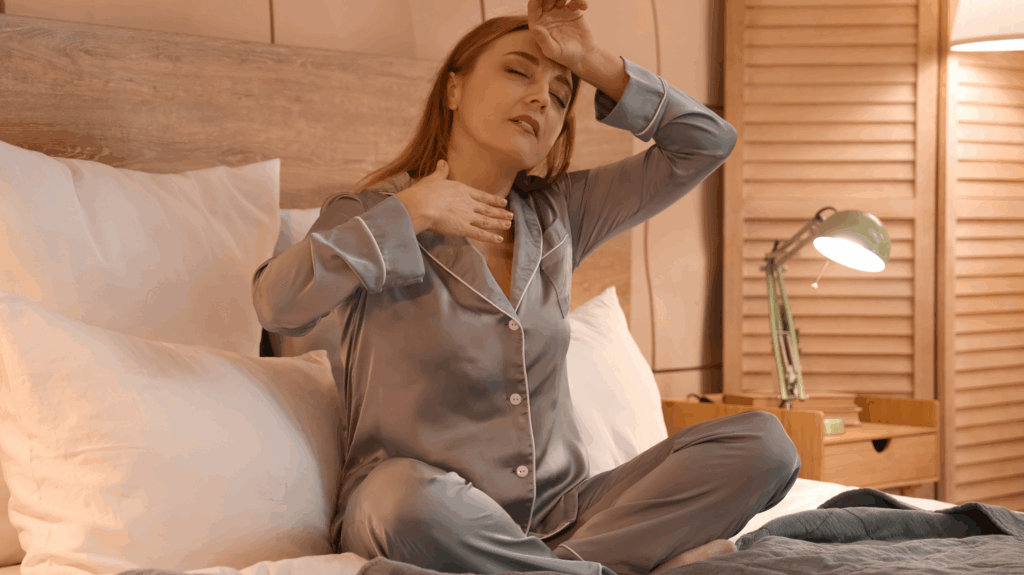
Symptoms of Premature Menopause – Everything You Need to Know
Premature menopause isn’t as rare as you might think. With so many symptoms of premature menopause leaning into indicators of other conditions, such as hormonal changes due to the menstrual cycle and pregnancy, it can be difficult to pinpoint whether you’re going through the transition.
Seeing as it’s less common to enter menopause prematurely, the thought of early menopause may not even enter your mind.
So, let’s take a look at everything you need to know about premature menopause.
What is premature menopause?
In a nutshell, premature menopause is when you enter menopause at an earlier age than expected due to the average age range.
Menopause is when you have had no periods (or spotting) for at least 12 consecutive months. You may, on the other hand, be experiencing the standard menopause symptoms but still be having some form of menstrual cycle (though it may be different to what you’re used to.) If that’s the case, you’re in perimenopause.
Typically, women tend to enter menopause in their early 50’s, with the average age being 51.
Premature menopause vs early menopause – what’s the difference?
So, what’s the difference between premature and early menopause?
Quite simply, it’s determined by how early your menopause is. Or, at what age you have not had menstrual bleeding (including spotting) for 12 months in a row.
While early menopause is when you have reached menopause before the age of 45, premature menopause happens before you’re 40 years old.
What’s the earliest age you can start menopause?
Believe it or not, you can enter menopause as early as your 20’s, though it’s extremely rare.
Those who start their menopause at age 35 is less of a rarity, though still uncommon.
How common is premature menopause?
Only 5% of women enter early menopause, with even fewer – a minuscule 1%, in fact – having premature menopause.
In terms of reaching menopause in your 20’s, this almost never happens, occurring in only 0.1% of women.
That said, just because it’s rare doesn’t mean it’s impossible. It’s important to know what premature menopause looks like so that you can identify symptoms and raise them with a professional healthcare provider.
Causes of early and premature menopause
Though rare, premature menopause does exist. Let’s take a look at what could be causing it. Remember, there are times where the trigger is completely unknown. However, the common causes of early and premature menopause include:
- Chemotherapy and/or radiation to treat cancer
- The removal of your ovaries via surgery
- The removal of your uterus via surgery (ie: a hysterectomy)
- The women in your family also went through menopause prematurely
- You got your first period very early (before the age of 11 years old)
- You have certain medical conditions, such as a thyroid disorder or Cronhn’s disease
- You smoke
- You’re HIV positive or have AIDS
Symptoms of premature menopause
As premature menopause is extremely uncommon, it can be difficult to spot the signs. With that in mind, let’s take a look at the symptoms of entering menopause prematurely.
Hot flashes and night sweats
Hot flashes and night sweats are amongst the most common perimenopause and menopause symptoms.
They feel like sudden bursts of spreading heat and can be accompanied by flushing of your skin and/or sweating.
You may find that the following make your hot flashes and night sweats worse:
- Eating spicy food
- Smoking (including vapes)
- Showering or having a bath that is too hot
- Consuming caffeine and/or alcohol
- Wearing heavy, hot clothing
- Hot weather and high humidity

Vaginal dryness
Vaginal dryness is an extremely common symptom of perimenopause and menopause, and creeps up quickly if you’re experiencing premature menopause.
Dryness downstairs can lead to an itchy vulva, feeling sore and sensitive and, therefore, a lower libido due to discomfort during intercourse and foreplay.
Joint pain
Though the figure isn’t exact, studies estimate that a huge 50% of women in perimenopause and beyond experience some form of musculoskeletal symptom, which includes joint pain.
As your hormone levels change, so does your bone density. Combine this with common weight gain when you enter this transition period (whether that’s premature menopause or not), and the result is often joint pain.
This can feel like having shooting pains in your joints, having a sore back or muscle aches, feeling generally stiff and swollen, or crackling and clicking more frequently when you move.
There are a variety of supplements for menopause joint pain which may offer significant relief.

Sleep disturbance and insomnia
A change to your sleeping habits can often be the hardest pill to swallow – whether your menopause is premature or not.
Usually, sleep disturbance is caused by the changes to your hormones – specifically oestrogen and progesterone.
Not only does this trigger night sweats which can wake you up, but it also impacts your melatonin production and interferes with your neurotransmitters that help to regulate your sleep.
If you’re struggling with sleep disturbance in premature menopause, the following tactics have helped others:
- Maintaining and following a consistent sleep schedule, going to bed and getting up at the same time every day (including weekends!)
- Avoiding naps, specifically late in the afternoon or in the evening
- Creating and sticking to a bedroom routine where you wind down for at least an hour before bed. Some dedicate this time to reading, listening to gentle music or having a good ol’ fashioned bubble bath (Epsom salts always help me, too!)
- Avoiding the use of devices before bed, especially in your bedroom. The light coming from tablets, phones and tv screens can make it tricky to fall asleep
- Ensuring your bedroom is as cool as possible to counteract the hot flashes. It’s advised that you sleep with a fan on, even in the winter, and that your bed linen consists of light layers of blankets rather than a heavy duvet
- Exercising daily but never too close to bed time
- Ditching caffeine and alcohol
- Avoiding eating for a few hours before going to sleep

Changes to your emotions
Unfortunately, menopause – and premature menopause – doesn’t just impact you physically. It also has a huge knock on effect on your mental and emotional health.
It’s not unusual to develop anxiety during menopause and perimenopause – whether that’s prematurely or “on time.” In fact, it’s happened so often that it’s referred to as “menopause anxiety.”
With all of the physical symptoms wrecking havoc, it takes a toll on your mental state, too. General worrying, panic and stress elevate while your hormone levels fluctuate. It’s common to experience extreme mood swings and sudden rage, seeming triggered by things that never used to bother you.
Depression, too, is a risk when it comes to premature menopause.
It’s super important that you seek help from your doctor if you’re struggling with your mental health. This is true whether you’re pre-menopausal, perimenopausal, menopausal or post-menopausal. No matter what stage of life you’re in, your doctors are there to assist you with your emotional and mental health. It’s just as important as your physical health, so if you’re struggling, please do book an appointment with your GP.
Breast tenderness
When it comes to women and breast tenderness, many people jump to the conclusion of “I must be pregnant.”
It’s easy to leap to the pregnancy idea, but breast tenderness is actually common when your hormones change. This can happen as you’re ovulating or on your period, plus when you’re transitioning through perimenopause and into menopause. So, while breast tenderness is a sign of pregnancy, it’s also an indication of a range of consequences due to hormonal shifts.
If you’re suspecting that you may be experiencing premature menopause and you have tender breasts, it’s worth tracking. Consider how tender, on a scale of 1 to 5, when they are at their most sensitive and whether anything makes them feel better or worse. These all provide clues that point toward a cause.

Headaches
Yes, premature menopause can, in fact, cause headaches and migraines. No matter when you enter perimenopause or menopause, headaches are a pretty common side effect of the changes in your hormone levels, affecting 3 times more women than men.
Your menstrual cycle changes in perimenopause – whether that takes place earlier than expected or not. This can have a knock on effect and trigger headaches. Not to mention, you’re trying to handle an array of physical side effects which can elevate your stress levels. In turn, this can cause headaches.
If you’re having headaches during premature menopause, make sure you’re drinking plenty of water, eating hydrating foods and working to keep your stress levels under control.
Brain fog, memory loss and difficulty concentrating
You’ll see brain fog represented in movies and the media when it comes to menopause. Unfortunately, it’s often not exaggerated, and it can be one of the most challenging side effects of perimenopause and menopause.
Brain fog in premature menopause and beyond feels like your brain has been covered in cotton wool. It makes it difficult to think clearly, and you often feel “foggy.”
This is down to your changing levels of oestrogen and progesterone. You may find yourself:
- Struggling to find the right words
- Being generally forgetful
- Struggling to stay focused and on-task, which is specifically difficult when going through menopause in the workplace.
Hair loss and/or hair thinning
If you’ve been noticing that your hair is thinning or falling out and you suspect premature menopause, it’s worth noting down to discuss with your doctor.
A study that took place in 2022 monitored 200 menopausal women. Of those 200 women, all two hundred of them experienced hair loss and thinning. 100% of the participants experienced this side effect!
This is often due to the changes to your oestrogen levels. As these levels dwindle, your hair growth cycle is affected, reducing the time period for growth and putting the cycle in “pause mode” before it has time to regrow.
Age does contribute toward hair loss, too, as your hair follicles get smaller over time. However, when it comes to premature menopause, it’s often down to the changes in your hormones.

Other changes to hair when you’re going through perimenopause and menopause include:
- Dry hair that feels like straw
- A loss of density and volume
- Changes to your ordinary hair texture
Weight gain
Many women struggle with weight control when they are transitioning into menopause. This directly impacts both physical and mental health, making many women lose confidence at a time where they’re already vulnerable and their emotions are heightened.
As your oestrogen and progesterone levels change, so too does your metabolism. Your muscle mass decreases, which means that fewer calories are burned, leading to a build up of fat and weight gain.
Of course, there could be other reasons why you’re gaining weight during premature menopause. A lack of sleep, for example, often leads to comfort eating which can provoke weight gain. Stress, too, can lead to weight gain.
Many women believe that it’s inevitable to gain weight when they reach menopause, no matter how old they are when they do. As a Menopause Nutritionist, I can promise you that you’re not doomed to gain weight.
It’s all about knowing what your body needs. That’s why I ditched all the silly weight loss strategies that simply don’t work. Don’t cut out whole food groups. Never skip meals. Don’t go hungry. It’s all about eating for yourself as an individual.

If you’re concerned about weight gain, take a look at my Menopause Midsection Makeover. It uses lab testing to identify what your body needs. We combine that with my nutritional knowledge and your food preferences (life’s too short to give up the things we love!) and we create a nutritional roadmap to weight loss that you can actually keep off.
Other unusual symptoms of premature menopause
While the above symptoms are the more common signs of premature menopause, there are some slightly more unusual ones. These symptoms aren’t spoken about much, but they absolutely can show up during perimenopause and menopause:
- Restless leg syndrome
- Skin problems (itchy skin, dryness and acne)
- Bloating and inflammation
- Tummy ache
- Changes to libido (often decreased, but some women find their sex drive increases)
- Incontinence
- Facial hair growth
- Itchy and/or ringing ears
Premature menopause – when to see a doctor
Remember, your doctor is always there to help you. You should never struggle by yourself. Reaching menopause – at any age – is a huge ordeal. You’re going through a monumental change, and it can cause a wide range of physical, emotional and mental symptoms.
If you’re experiencing any of the symptoms listed on this article alongside not having a period for 12 months in a row, you are likely going through premature menopause. See your doctor if this is the case for you.
If you are having these symptoms but you are still having a period of some sort – even if they’re different from what you’re used to – you may be prematurely in perimenopause. Your doctor should know this, too, as they will need to test for other conditions.
If you are 45 or younger and you’re experiencing these symptoms, your doctor should be able to run some tests to monitor your hormone levels to confirm a diagnosis. They will want to check for other conditions, too, such as thyroid issues.
Premature menopause in a nutshell
Premature menopause is a challenging thing to wrap your head around. Not only are all these symptoms – including hot flashes and night sweats, vaginal dryness, joint pain, sleep disturbance, mental health problems, headaches, weight gain and more – causing a strain on you, but trying to understand why this is happening now rather than when it “should” can lead to frustration.
It’s really important that you seek the menopause help that you need. Your doctor will assist you, providing you with different options after confirming you are, in fact, prematurely menopausal. To make the most of your appointment, it’s recommended that you track your symptoms for a few months.
Premature menopause can be lonely, too. So, make sure you openly discuss how you feel with someone you trust. That way, they’ll be able to understand how to support you during menopause, too.
Leave a Reply
- free ebook alert -
WHAT TO EXPECT WHEN YOU’RE
going through the menopause
Demystify your understanding of what’s happening to you. Arm yourself with solid, game-changing information to support you through this challenging phase of your life.
grab your copy now →
WHAT TO EXPECT WHEN YOU’RE
going through the menopause
It really helps to understand the wide range of symptoms premature menopause can bring. Tracking symptoms and seeking professional guidance is so important. For more women’s health insights, I also find resources on SheMed’s blogs really useful.